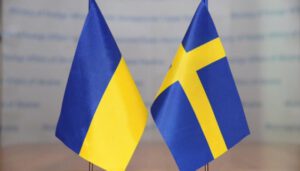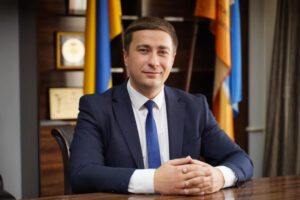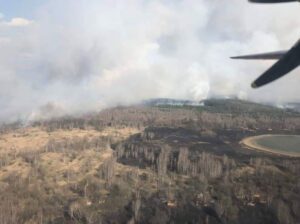
Head of Rivne Regional Military Administration Vitaliy Koval signed on Wednesday a decree banning civilians from visiting forest areas in the region for the duration of martial law. “From now on, it is forbidden to visit the forest in Rivne region! The corresponding decree was signed yesterday. It is valid for the period of the war. The exception is the Armed Forces of Ukraine, security forces, representatives of executive authorities, local self-government and those working with the forest,” Koval wrote in Telegram on Thursday.
He urged to treat such restrictions with understanding. “Your safety is the most important!” Koval said.

President of Ukraine Volodymyr Zelensky has invited Sweden to take part in the post-war reconstruction of Ukraine.
“I am sure that together we will be able to ensure peace, and therefore we need to think about the restoration of Ukraine after this war right now. And it will happen. I invite Swedish architects, Swedish companies, the Swedish state, your people to take part in this historical project. Ukraine was beautiful, and now it will become great, because such is our people,” Zelensky said, speaking to the Swedish Parliament on Thursday.
“I invite you to demonstrate to the world, to all modern and future generations, that war does not give results, but peace does. And life,” he said.
According to him, Sweden became the first state to which Ukraine offered a “big restoration project.”
“You can take patronage over any city of Ukraine, region or industry for their restoration. I am sure that your leadership will be indispensable. Your technologies, business and love of life, the ability to organize space are in the interests of people,” the president said.

Millions of Ukrainians in more than ten cities are deprived of access to drinking water due to the aggression of the Russian military, Commissioner for Human Rights of the Verkhovna Rada of Ukraine Liudmyla Denisova has said.
“Due to the actions of the Russian occupiers, the right of millions of Ukrainians to access to drinking water is being violated. The war partially or completely deprived residents of Mariupol, Mykolaiv, Kharkiv, Okhtyrka, Izium, Makariv, Polohy, Vasylivka, Orikhiv, Huliaipole, Chernihiv, Trostianets and many other settlements,” the ombudsman said on Telegram channel on Thursday.
According to Denisova, 200,000 people in Donetsk region alone do not have access to drinking water.
“With the increase in the scale of the clashes, there is a threat that in the coming weeks the Donetsk region may be completely disconnected from the water supply,” her message said.

The Verkhovna Rada has received a resignation letter from the Minister of Agrarian Policy and Food Roman Leschenko, representative of the Cabinet of Ministers in the Verkhovna Rada Taras Melnychuk said.
“The Verkhovna Rada received a statement from Leschenko Roman Mykolayovych about his resignation from the post of Minister of Agrarian Policy and Food of Ukraine,” Melnychuk wrote in Telegram on Thursday.

Ukrainian Yuriy Zakhareev has won a gold medal at the European Boxing Championship among athletes under the age of 22, which takes place in Croatia.
“On March 23, the final bouts of the European U22 Boxing Championship took place in Croatia. Ukrainian Yuriy Zakhareev became the European champion in the weight category up to 71 kg. In the fight for the gold our boxer defeated an opponent from Wales, Garan Croft,” the press service of the Ministry of Youth and Sports said in a statement.
Earlier silver medals were won by Andriy Yefymovich (weight category up to 48 kg), Maksym Vlasiuk (weight category up to 60 kg) and Ivan Sapun (weight category up to 86 kg).
According to the results of the continental championship competitions, the Ukrainian boxing team won ten medals: two gold, three silver and five bronze.

Fires near the Chornobyl nuclear power plant cannot be completely extinguished, and some increase in cesium concentrations has been recorded in Kyiv and west of Chornobyl, the International Nuclear Energy Agency (IAEA) said, citing the State Nuclear Regulatory Inspectorate of Ukraine.
“Ukraine’s regulatory authority informed the IAEA that firefighters were trying to extinguish wildfires near the Chornobyl NPP, an area which has seen such outbreaks also in previous years. The fire brigade from the town of Chornobyl has extinguished four fires, but there are still ongoing fires,” the IAEA said on its website on Wednesday in the evening.
According to the release, the local fire station does not currently have access to the electricity grid, the regulator said. In the meantime, the station is relying on diesel generators for power, for which fuel is required, it added.
The IAEA also draws attention to the fact that, in the Exclusion Zone, the regulator said radiation measurements are not currently being performed. It said slight increases in caesium air concentrations had been detected in Kyiv and at two NPP sites west of Chornobyl, but the regulator told the IAEA that they did not pose significant radiological concerns.
At the same time, in a video message posted on the IAEA website on Wednesday, IAEA Director General Rafael Mariano Grossi called the situation when major nuclear facilities operate in an armed conflict zone “dramatic and unique,” and noted that the situation remains distressing, and “the need to prevent a nuclear accident becomes more pressing with each day that passes.”
According to him, “intensive consultations have been ongoing for many days now, but a positive outcome still eludes us.”